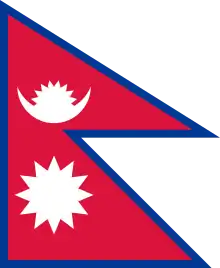2002 in Nepal
Incumbents
- Monarch: Gyanendra[1]
- Prime Minister: Sher Bahadur Deuba (until 4 October), Lokendra Bahadur Chand (starting 11 October)
- Chief Justice: Keshav Prasad Upadhyaya (until 5 December), Kedar Nath Upadhyaya (starting 5 December)
Events
- January 18 - US Secretary of State Colin Powell arrives in Nepal supporting the government efforts against fighting Maoist terrorist.[2]
- February 15 - Members of the breakaway faction of CPN-UML rejoins the party, while some under the leadership of CP Mainali forms Communist Party of Nepal (Marxist–Leninist) declining to rejoin.
- February 27 - Maoists launch simultaneous attacks in Mangalsen and Sanfebagar of Accham District killing 141 including the Chief District Officer.[3]
- May 22 - King Gyanendra dissolves parliament on recommendation of Prime Minister Sher Bahadur Deuba and calls for election on November 13.
- May 27
- State of emergency is extended for three months through royal ordinance.
- Maoists attack a Royal Nepal Army base in Khara, Rukum. A dozen soldiers are killed whereas over 100 maoists are killed in the attack.[4]
- October 3 - Deuba proposes to delay election for a year.
- October 4 - King Gyanendra dismisses Prime Minister Sher Bahadur Deuba terming him incapable.
- November 14 - Maoists attack Khalanga, the district headquarter of Jumla.
Births
- July 10 – Prince Hridayendra of Nepal
Deaths
- October 15 - Lain Singh Bangdel, artist and novelist
References
- "Gyanendra | king of Nepal". Encyclopedia Britannica. Retrieved 2 January 2020.
- "Remarks With Prime Minister of Nepal Sher Bahadur Deuba". US Department of State. 2002-01-18. Retrieved 13 May 2019.
- "the Achham incident could have been averted". Sajha.com, Kathmandu Post. Archived from the original on 2020-07-24. Retrieved 11 May 2019.
- "Nepal troops 'thwart' rebel attack". BBC. 2002-06-14. Retrieved 11 May 2019.
This article is issued from Wikipedia. The text is licensed under Creative Commons - Attribution - Sharealike. Additional terms may apply for the media files.
